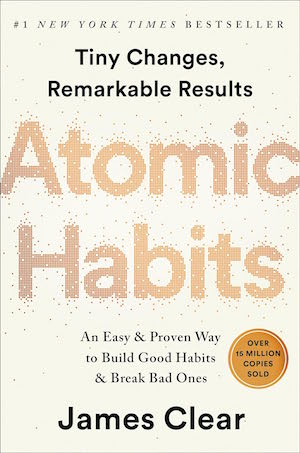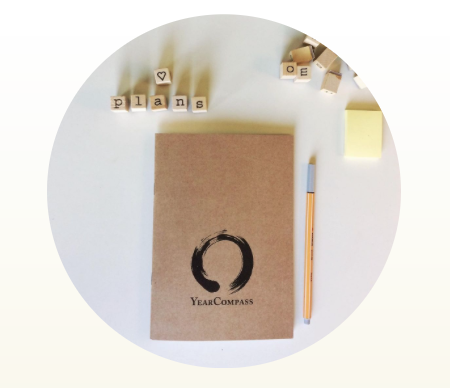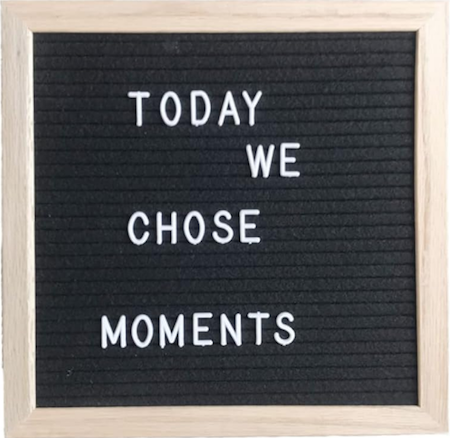How to Use Cathedral Thinking and Intentional Words to Organize Your Year

We’re not quite a week into the year. And yet, if you had resolutions, you may have already broken them. Vowed to eat healthy, but that boozy New Year’s Day brunch blew that plan out of the water? Planned to exercise daily, but those two days back at work wore you out, so you slept in instead of going to the gym this weekend?
You aren’t alone. In fact, the second Friday in January is known as Quitter’s Day because so many people have already tossed their resolutions by that day. Research by Baylor College of Medicine found that 88% of people give up their New Year’s Resolutions by the end of January; a large percentage of the remainder part ways with their resolutions before the end of April.
WHY DON’T NEW YEAR’S RESOLUTIONS WORK (FOR MOST PEOPLE)?
It’s not that resolutions can’t work, but that people generally go about them in the wrong way.
Unrealistic Expectations
It’s cute when three-year-olds tell you they’re going to be princesses, basketball stars, or wizards. But if you’re a grownup and you “resolve” that you’re going to change who you are in some massive way, your ambitious goals may get in the way of reality.
If you set an aspirational goal that’s so ambitious that you can’t possible achieve it, you’re guaranteeing that you’ll be discouraged each time you hit a setback or your progress is glacial.
Think about what I wrote in Paper Doll Explains Aspirational vs. Inspirational Clutter. Just as when you fill your space with tangible aspirational clutter, filling your head with an aspiration to achieve something lofty without the any undergirding infrastructure guarantees disillusionment and falling short.
Black-and-White Thinking
It’s common to approach goal-setting with an all-or-nothing mentality.
“Either I will publish a Pulitzer Prize-winning novel this year (even though I haven’t written anything since college)!” or “I’m going to keep this house perfectly organized every day from now on (even though I haven’t seen my keys in three weeks)!” leads people to give up when they hit the first bump in the road, so they stop writing or putting things away.
Too often, people craft their resolutions as, “I’m going to completely change how I behave” and that means that the minute they revert to their innate habits, they declare a loss. (A hot fudge sundae doesn’t mean your diet is dead and buried; tomorrow, have a salad.)
We don’t need a new year, or a new month, or even a new day to continue on with our goals. As I talked about in Organizing A Fresh Start: Catalysts for Success, we can always find new opportunities to re-set.
Shame-based Motivation
- Are you a carrot or stick person? Are you motivated to win something for the glory or by fear of not achieving?
- Are you more likely to go after a goal because it’s something you truly desire, or because you’ve been guilted into it?
- Do you want to achieve something because it’s your dream, or because you’ve been conditioned through social pressure (or from your mother-in-law or your work frenemy) to do something?
If you only set a goal because someone makes you feel bad about who you are now (whether in terms of your shape, your status, or your accolades), that extrinsic motivation probably isn’t going to have staying power to get you out of bed to run on a rainy morning or to get your butt on the piano bench to practice scales.
If you’re focused on something negative and are shamed (or shaming yourself) into changing who you are, that self-criticism is going to prevent you from making any sustainable change.
And whenever we don’t meet our resolutions, that above-mentioned black-and-white thinking can lead to low self-esteem, feelings of inadequacy, and poor mental health.
Lack of Strategic Planning
If you rang out the old year by resolving to “lose weight in 2025” or even to “lose 25 pounds in 2025,” you were resolving to magically achieve something. You can’t really “do” a resolution.
This is why the concept of SMART goals is so popular, because they promise that if you sit down and define your goals by making them specific, measurable, attainable, relevant, and time sensitive, and strategize how you’ll take action, when, and how often, and are clear on your purpose, you’ll stand a better chance. I’ve written about that often, and back in 2014 in Achieve Your Goals: Modern Truths Behind the Urban Legend, I spelled out my alternative steps to really making your goals come alive.
Merely stating your resolution without spelling out the strategies and actionable tactics is a recipe for a pretty weak soup of achievement.
For more on the problematic nature of New Year’s resolutions, read:
- The Psychology Behind Why New Year’s Resolutions Fail (VeryWellMind.com)
- New Year’s resolutions often don’t last. Here’s why they fail and how to keep them, according to an expert. (CBS)
- Why New Year’s Resolutions Don’t Work (And What You Can Do Instead!) (Forbes)
Instead, Make Real Change Through Intentions and Habits
Set positive intentions — When you do create goals, focus on whatever you want to achieve because the goal uplifts you, not because you’re trying to avoid something. (Will you be delighted, or will you only be avoiding a negative result? Unless you’re motivated by the stick, find the carrot…or the cookie.)
Have a plan, not a dream — Identify any obstacles you’ve faced in the past anticipate what may arise in the future so you can develop strategies to overcome them.
Set small, achievable objectives — You’re not going to put away everything the minute you are done with it, but you can set a timer for ten minutes before your lunch break to file away everything that’s piled up on your desk during the morning. Keep breaking down large aspects of change into ever-smaller, more manageable tasks.
In fact, if you really want to change your behaviors, I suggest reading (or re-reading) James Clear’s Atomic Habits: An Easy & Proven Way to Build Good Habits & Break Bad Ones.

Clear’s book is one of the most approachable guides to making small behavioral changes so that you can replicated them and build on them to achieve what you want.
Treat yourself with kindness — Don’t beat yourself up over backsliding; use it as an opportunity to investigate what’s tripping you up and look for creative solutions. The goal is to catch yourself winning.
Acknowledge that setbacks happen to everyone; focus on progress, not perfection. (Perfection is boring! Figuring out why you always throw your coat on a chair instead of hanging it up or always procrastinate about refilling prescriptions gives you opportunities to win!)
Seek — and accept — support! — There’s a reason people say it takes a village and that no man is an island. Humans are social animals; we’re not meant to do it all ourselves. Whether you seek the support of family or friends, delegate lesser tasks to staffers so you can focus on improving your unique skills, or work with a counselor, therapist, or professional organizer who can provide accountability and training, don’t feel like you have to go it alone.
GO LONG; MAKE A CHANGE
I’m just not a fan of resolutions. I am far more enamored of changing habits. If resolutions work for you and help you make a fresh start, go for it. But if you struggle with resolutions, it’s OK. There are better ways to introduce change in your life.
Longtime Paper Doll readers know that I’m a big fan of using words to create a positive mindset. Once I have a vision for what I want my life (or my year) to look like, I can build a theme and see if each habit or action dovetails or departs from that theme. And we’re going to look at that in a moment. But I’ve recently been introduced two additional concepts for guiding your thoughts and actions.
Cathedral Thinking
Greta Thunberg has been quoted as saying, “Avoiding climate breakdown will require cathedral thinking. We must lay the foundation while we may not know exactly how to build the ceiling.”
Oooh, cathedral thinking! I’m picturing time-lapse video of a cathedral being built from the foundation upward as the people and the city around the area change and grow over decades and centuries.
I was unfamiliar with the term “cathedral thinking” before I heard Thunberg’s quote, and did some research. Officially, cathedral thinking is a mindset focused on long-term planning and thinking about the future rather than the present. Originating in medieval Europe, the concept developed from the fact that builders of grand cathedral began projects they knew would not reach fruition in their lifetimes; they were thinking generationally.

Duomo di Orvieto (Orvieto Cathedral) Umbria, Italy @2018 Julie Bestry
Cathedral thinking is a way to view the problems we face as challenges requiring effort — sometimes collective effort by that village — and an investment of time, and perhaps money, over the long haul. When you’re talking about building literal cathedrals, that long-term planning, investment in the future prioritization of sustainability can create a tangible monument to the work you’ve put in.
But ever since I heard Thunberg’s quote, I’ve been thinking about how cathedral thinking applies to building our future selves. Maybe our initial goals are short-term: to get our homes or offices organized, or to learn how to say no to obligations that don’t fulfill us, to go to the gym, or start eating healthy.
But none of these goals exist in a vacuum. We don’t want to lose weight because the number on the scale is somehow meaningful. We’re not decluttering (merely) so that our homes look more orderly. We’re not culling the energy vampire tasks from our schedules so we’ll have a more balanced work-life schedule. Those are the interim benchmarks; those are the foundations and scaffolding and various levels of the cathedral of our individual selves.
But our true cathedrals are who and what these habits will help us become. Better eating, exercise, self-care, stress-reduction, and organized spaces mean that we will be happier, healthier, and alive and vital for longer so that we can be with the people we love, doing the things we care about.
Anyone doing a reality check knows we don’t write books to become rich; almost no published authors are making that kind of bank; nor are artists. Instead, it’s about legacy.
James Clear suggests that we can change our habits by aligning them with our identity. “I am the kind of person who eats five servings of vegetables a day” or “I am the kind of person who hangs up her clothes” may not be true, yet, but it’s tying acts to the self-image to which one aspires.
As long as that identity isn’t so aspirational as to seem out of reach, it can override the tendency we all have to blow off our goals when we just aren’t feeling it; when we just don’t wanna.
Your aspirational goals are part of your legacy, and your legacy is going to take a lifetime to build. You are a cathedral. Start by laying the foundation, and keep the future generations (that is, iterations) of your identity moving forward.
Make a Change
I’m sure you’ve heard the saying that “insanity is doing the same thing over and over again and expecting different results.”
We all struggle. Change is scary. Fear of failure, fear of success, and annoyance (and avoidance of annoyance) keep us stuck, year after year.
Recently, I was thinking about how, ever since the start of the pandemic, I’ve felt stuck. I work hard to stay safe, in terms of my health. I still wear a mask in indoor public settings and avoid crowds. But in the last six weeks, I’ve still had health issues; first, as I reported last month, I had a rough bout of vertigo; then mid-December, I had a cold (and it was, though lingering, just a cold). I petulantly resented that I’ve taken all of these precautions, have missed out on a lot of the joys of life in these years since 2020, and still got sick.
We all take precautions to protect ourselves professionally or personally, to avoid pain (the stick) but that often means we never get the carrot or the cookie. Eventually, as I wrote about in Paper Doll Says: Don’t Get Stuck in a Rut — Take Big Leaps, we have to get out of our comfort zones.
This was in my head when I had a conversation last week with the always-fabulous Deb Lee, productivity consultant, connector-of-humans, and amazing friend. Deb was talking about marketing and entrepreneurship expert Amy Porterfield, and how she often advises people to Do Something Different. You can listen to Amy’s podcast, #497: Do Something Different: A Method For Getting Unstuck, for a sense of how this philosophy, of doing something in a different way, can shake you out of your rut, blow out the cobwebs, and bring new ideas and new opportunities.
And it wasn’t just Deb quoting Amy. Within a day, my colleague and the best darned Evernote Expert you could want to know (and I’m saying that as someone who has been an Evernote Certified Expert for the past decade), Stacey Harmon of Harmon Enterprises, echoed the same idea. In her newsletter, she talked about how she chooses a word/concept of the year, and for this year, Stacey wrote,
“For 2025, I’ve chosen “Do things differently. Get different results.”
(In her newsletter, she talks about how each year, she creates a custom Evernote Home cover image containing her word or phrase of the year, overlying a photo that’s attractive to her and is in alignment with her goal. Read more about how Stacey tracks her word/phrase of the year in Evernote.)
Although hers isn’t my phrase for 2025, I’m borrowing the inspiration to remind myself to spread my wings a bit more and embrace a larger life.
USE YOUR WORDS TO ORGANIZE THE LIFE YOU WANT
Most years, I blog about the advantage of selecting a word or phrase of the year to create your mindset. While resolutions state where you want to end up and goals allow you to spell out the habits that can get you there, words or mottos for the year are different.

Scrabble Tile Photo by Brett Jordan on Unsplash
Whether you pick a word or phrase or song doesn’t matter. Rather, all formats of these words allow to set your intentions for where you want to focus your energy for the coming year in a way that uplifts and expands instead of setting restrictions and boundaries.
Last year, in Toss Old Socks, Pack Away 2023, and Adjust Your Attitude for 2024, I talked about my approach to each new year.
In particular, I went deep and wide into the concept of the personal review, a method for reflecting on the year that’s ended to get a sense of what is really meaningful to you (in categories like health, finances, professional development, business, relationships, personal growth, and community) for guiding your approach to the new year.
I recommended the amazing Year Compass, for doing your annual review and for developing your hopes, dreams, goals, and plans for the coming year.

And I’d picked the word UPGRADE as my guiding word of 2024, but explained that it was battling it out with PRONOIA. I wrote:
Don’t worry if you’ve never heard of it. Honestly, the first time I heard the word, I assumed it was made up. It’s opposite of paranoia; a person experiencing pronoia believes that the world around them conspires to do them good. Obviously, taken to extremes, it might seem like psychological or spiritual irrationality.
But Buddist principles haven’t been working for me, I’m still trying to get a handle on the Stoics I talked about in Toxic Productivity Part 2: How to Change Your Mindset. I feel the pull of a bigger change in my life, and I think “pronoia” dovetails with the idea of a life upgrade.
Thus, I keep coming back to the Carly Pearl song in which I first heard the word “pronoia.”
This year, I’ve decided to upgrade the word “pronoia” to be my personal life motto. The concept that the world conspires in your favor is just too inspiring to apply to only one year.
Once you do your personal review, you’ll know what you want to accomplish this year, and more importantly, why. Maintain the motivation and energy of your “why” with a word or phrase that reflects the overall concept you want your year to engender. It’s not about losing weight, or maybe even health, but a word that reflects beyond the literal to the the larger idea of how you want to feel. Maybe buoyant or lighthearted or delighted?
Consider:
- a word of the year
- multiple words (like a trio of words) of the year
- a quote or motto or mantra of the year
- a song of the year (or a song title, or a lyric)
Whatever you select is your personal theme for the coming year. Whatever you want to remember about your goals and your attitude is what this word or phrase or mantra will reflect.
But don’t just leave your word sitting there on a notepad. Your goal is the best product or service — it’s the business of you. Use your (organized) space to keep your attention on your intention for the year, the building of your personal cathedral.
Advertise your theme word(s) anywhere or everywhere it’ll catch your attention. Don’t let it fade into the woodwork!
Promote your theme to yourself wherever you need a little push to live in accordance with the values you’re setting for yourself. Display it:
- on a sticky note on the fridge or your bathroom mirror
- on a bookmark you’ll see each time you open or close whatever book you’re reading
- on a both sides of the door leading to and from your garage, so you’ll be reminded of it when coming and going
- on one of those fun little felt word board with changeable letters placed so you see it from your desk chair or wherever you spend the most time

- on the lid or door of the washing machine, to remind you that those “adulting” tasks deserve appreciation
- on the door to your closet so you’ll be reminded to dress and act in accordance with your theme
- as the title of a vision board, along with images reflecting the meaning of your motivating words, phrases, and songs.
- on the lock screen of your phone
- as the desktop graphic of your computer
- on whatever software allows you to customize your home screen (like Stacey’s advice for Evernote Home)
Don’t just engage your visual sense. Add an auditory component:
- Change your wakeup alarm on your phone to your theme song.
- Record yourself speaking your word or mantra (or have a loved one do it) and use the sound file as an alarm to remind you periodically at a point in the day when your inspiration is likely to flag.
- Recite your word or phrase every night before you go to sleep and upon waking. Make it a mantra.
Whatever you pick should soothe and motivate, providing you with clearer sense of the vision you want your actions to reflect. Picture it on a banner as you cross the finish line, or carved into the marble over the doorway of your personal cathedral.
Find Your Inspiration
You don’t have to rush to find your word or phrase. A year is 365 days and we’re only six days in. And if you find that the word your pick is ill-fitting, like a jacket that’s too tight in the shoulders, you can change it.
To get you started, peruse:
Choose a One-Word Theme: We Review Our 2024 Themes and Reveal Our 2025 Themes (Happier Podcast with Gretchen Rubin)
One Word Themes for 2025 (Gretchen Rubin)
How To Choose A Word Of The Year (Elizabeth Rider)
New Year Intention (Jonda Beattie)
246 Word of the Year Ideas for a Better 2025 (GoodGoodGood.co)
2025 Word of the Year Ideas (Morgan Harper Nichols has 60 great, often unexpected words)
2025 Word of the Year (and 100 ideas for yours) (Elizabeth McKnight)
Paper Doll’s Words of Intention
I’ll be honest — I’m not ready for 2025. I usually use the last two weeks of the year to do my annual review and find the right word or phrase for the coming year. But, as mentioned, I had the creeping crud from the week before Christmas until close to the new year, and haven’t yet found my word. I’m leaning toward ENGAGE.
I liked having a word and a song last year, and keep hearing Florence and the Machine’s Dog Days Are Over running through my head, but suspect it’s one of those songs where I’m not sure that the lyrics mean what I think they mean. I’ve noticed that Natasha Beddingfield’s 2004 hit, Unwritten, is playing everywhere lately, and feel like it’s speaking to cautious, perfectionist me:
I break tradition
Sometimes my tries are outside the lines
We’ve been conditioned to not make mistakes
But I can’t live that way
Songwriters: Danielle A. Brisebois / Natasha Anne Bedingfield / Wayne Steven Jr Rodrigues
Unwritten lyrics ©2004 Sony/ATV Music Publishing LLC
Whatever I choose, I’m considering the advice of Deb and Stacey, and remembering the words of essayist and novelist Susan Sontag, in her Reborn: Journals and Notebooks, 1947-1963, where she emphasized courageously taking leaps and embracing change:
“I must change my life so that I can live it, not wait for it.”
Do you have a word, phrase, motto, or song of the year to support your 2025 mindset?




I had so many thoughts while I was reading this – all good, don’t worry!
I recently listened to a TED Talk about setting small, achievable objectives that you might enjoy: Christine Carter: The 1-minute secret to forming a new habit.
I love a good TEDTalk, and Christine Carter really delivered the goods. Thank you for sharing! Her point about having a willingness to be bad at our goal behavior really resonates with me; there is SO much in my life I didn’t do out of fear of being bad. (I wanted to take Italian in college but feared it would ruin my GPA; almost 40 years later, I’m studying diligently, but wish I’d taken those classes where I could have learned from experts.) Her teeny-tiny baby step approach is absolutely the way I try to conquer perfectionist procrastination.
Thank you for reading and sharing your thoughts!
Julie, we are on the same page. The class Jonda and I are teaching on Friday is about setting intentions by selecting your word or phrase for the year and then creating micro-goals to support you in your quest. My blog today also reflects that.
Thank you for teaching me about Cathedral Thinking. I love that expression and will use it on Friday as we explore goals and words to guide us.
I love this. I included Jonda’s post on her ritual for setting an intention, and love that you are walking your attendees through those baby step micro-goals undergirding that intentional word or phrase. I really believe having such a word or phrase is so much more powerful because it connects us with the truth of what we want.
I’m delighted that you also like the idea of Cathedral Thinking. I know I took some liberties in mapping an architectural approach onto human personal development, but I really think it fits. Thank you for reading and sharing!
Julie, I have been doing the word of the year for many years and usually it has really worked. Last year was an exception but I am trying again with “re-emerge”. I have my graphic on my laptop and an addition to my dream board. But I have never thought about adding a music thought. I’m playing with the idea of “Let It Go” by Idina Menzel.
Jonda, I hope you saw that I linked to your post about your ritual for setting an intention. And of course, last year was an exception, and I think your new word is remarkably apt.
I know that going musical doesn’t work for everyone, but I find that having a musical hook helps center me. “Let It Go” sounds like a perfect option! Thanks for sharing your thoughts!
This morning my waking-up prayer was on this very topic. God, what do you want me to be seeking, pursuing, listening to, doing? I haven’t really settled on a word yet. I feel change is in the air, perhaps because of my age and stage.
My family has had a lot of illness since Thanksgiving. We can’t seem to get everyone healthy. Rough year! I suppose the upside of illness is that it gives you time to pause and reflect. It also reminds me that I can plan, but I really don’t know what is going to happen.
I love the idea of cathedral thinking. I have great admiration for people who act in a way that will primarily benefit future generations. It’s selfless, and very counter to the mindset of current American culture. I think of this in terms of my family, and can see that my parents are doing the same. My father says, “The fat lady may not be singing yet, but I think she’s humming…”
I think I’ll bring this up with my husband over dinner. It would be nice to have a direction that we are moving in together.
You’ve relayed all of this in such a beautiful way, Seana. I’m sorry (and empathize) with the spate of illness your family has had; I hope that now that we’re in a new year, you will all be healthy and heading in the direction you most want.
Thank you for reading and for responding so thoughtfully!
As always, there are many gems and things to think about here. Several caught my attention:
• “Progress not perfection.” – Always a favorite. What’s perfect anyway? But progress is affirming and life-altering.
• “Catch yourself winning.” – YES!!! How often are we critical of ourselves? But by reframing what you’re looking for, you’re building in acknowledgment and encouragement for the changes you’re making.
• “Seek support.” – I am often the person who others seek for support. But especially recently, I’m realizing the value of getting support myself. I am working on a project and put some support in place that’s making all the difference. It’s so much easier to make progress when you have someone to talk things through, offer suggestions, and be accountable to.
• “Do something different.” – I have been doing different things for several days, but here’s a slight twist on what you suggested. But the value of changing things up is the energy it gives. I can get very comfortable working from home. There’s nothing wrong with that. But getting out to explore new places, seeing some live performances and art installations, and changing the scenery made me open up in a welcome way.
• “You don’t have to rush to find your word or phrase.” – Thank you for this. Like you, I’m not ready to choose yet. I’ve had a word and phrase for the last few years. I’m leaning toward just a phrase this year, but we’ll see where I’ll land. I have a file with possible contenders, but I am not ready to commit yet. Thank you for the ‘permission’ to choose at my pace.
Well, geez, Linda, this feels like a fan letter…and I love it! I love the “gems” you found; sometimes, I think I write what I need to read. I’m terrible at seeking external support and at doing different things (outside my wheelhouse), but I’m working on it, and look forward to catching myself winning. 😉
We’ll have to circle back and all share our words once we are sure of them. Thank you for reading and for being such a great cheerleader!
I don’t make New Years Resolutions. It’s more about working on improving myself on an ongoing basis. I love Atomic Habits and I have read it twice. I highly recommend it for anyone who want to work on changing habits.
I get it — I think it’s been about 40 years since I made a resolution, and have been a lot happier in the years since selecting an intentional word/phrase has become a “thing.”
I’m glad we’re on the same page about Atomic Habits; it really is stellar! Thanks for reading!
Your post resonated with me. I tend to think in terms of yoga and for years, I have been thinking to myself “I am a tree” like “tree pose” in yoga with steady legs and trunk and my limbs swaying in the breeze. That is my cathedral. I try to think about my goals every year but I ground it (just like a tree!) in reality and based on my values. I love the idea of a cathedral with a legacy to come in future generations which is not such a leap from a tree which you plant for future generations to enjoy (just saying). You planted so many great ideas here that I think I need to read this again to get all the great nuggets!
I love your yoga and tree metaphors, and trees (like seedlings, then saplings, then young trees, and eventually mighty ones) are just like cathedrals in that they have so many iterations.
Thank you for your kind words and for reading!
Great post, Julie. Thanks for sharing your thoughts. It’s always a pleasure to read your content.
I love the Atomic Habits book! It’s one of my go-to books when I need to find simple ways to create steps to achieve my goals.
Thanks, Sabrina! I try to tackle some aspect of this topic each year, and just when I think I won’t have anything new to say about it, I find some new angle calling to me.
And yes, Atomic Habits rocks! I’m always finding something new and resonant in it.
This was a tough post for me as I feel too overwhelmed to look very far ahead. I used to take part of every New Year’s Day to write down the best of the past year and a short “Bucket List” for the new year. Sigh…
However, I loved the suggestion of a song to motivate/inspire you. As a Springsteen fan “American Land”,
which reminds me of sitting in an Irish pub with my two sons, and “Blinded By the Light” will be great this year. 🙂
Thank you Julie!
The great thing about looking ahead is that you can to decide how far into the future you choose. For example, the book The Twelve-Week Year by Brian Moran (https://12weekyear.com/) advocates planning for the coming three(ish) months and then taking a week off to re-set. You could pick a theme word for January, and revisit at the end of the month. Always remember that the ideas in these posts are guidelines, not boundaries.
I’m glad the idea of selecting a motivating song works for you! Thank you for reading and sending your feedback.
Thanks for the mention, Julie. 😊 “Do something different” are going to be my three words or go-to phrase this year. We (and by we, I mean me) can’t expect different results if we keep doing the same (safe-ish) things. So I will look for tiny ways to DSD to keep the momentum going and keep me learning and growing.
(even if I’m a little uncomfortable)
P.S. I love the notion of cathedral thinking. It reminds me of the quote (paraphrasing here): do what you can with what you have. Which is little bit of being in the present AND reaching into the future. Start before every single duck is lined up and get the core pieces in place for when you meet up with future versions you.
I loved this post, really resonated with me. Thanks for always being so thoughtful.
(really long P.S., I know 😊)
You’ve got it, exactly. We can’t do anything in the past or the future; we can only “do” something right now. But we can learn from the past and build toward the future. The ducks will just have to catch up with us.
Thank you for reading, for your thoughts, and for as many P.S. words as you ever want to share!
I love, love, love the concept of Cathedral Thinking. Thank you for bringing that knowledge into my life. The word that keeps coming into my head for 2025 is…Yet. Not only is it a key word in the neuroplasticity research, but it reminds me that the world is not all ones and zeros (black/white). I don’t know how to build the cathedral ceiling…yet. My XYZ program hasn’t reached thousands of people…yet. I haven’t eaten lunch…yet. I’m hungry. Gotta go.
Yet. Wow, that one word has so much hope and aspiration behind it. It’s not that we can’t do X, just that we haven’t mastered it yet, and the future is wide open with all possibilities.
You crack me up, Melissa, and I hope you had a good lunch. Yet is only a few letters, but it’s a mighty mindset! Thank you!